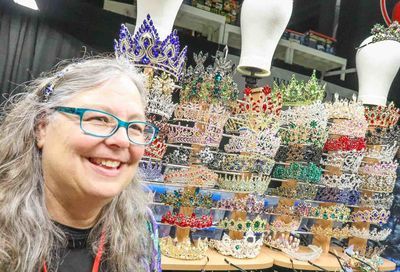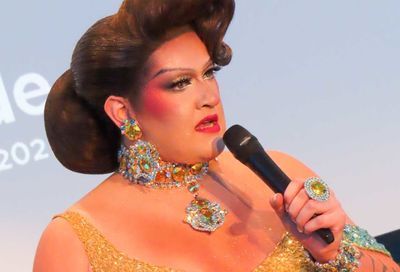Georgia Book Ban May Have Created “Hostile Environment”
U.S. Department of Education took issue with the way district officials removed allegedly "sexually explicit" books from school shelves.

The U.S. Department of Education’s Office for Civil Rights recently announced a resolution with a Georgia school district regarding how it pursued a 2022 ban on allegedly “sexually explicit” books.
The resolution, reached with Forsyth County Schools, comes after the federal Education Department investigated whether the way the district sought to ban books may have created a “hostile environment” for students based on race and sexual orientation, in violation of Title IX of the Education Amendments of 1972 and Title VII of the Civil Rights Act of 1964.
The debate over the books in the suburban Atlanta-area district, which serves approximately 54,000 students, came after parents complained about books they believed contained “sexually explicit” were being made available to students.
In response, the district superintendent, Dr. Jeff Bearden, asked school staff members to review any material they believed may contain sexually explicit content. The resulting list of challenged books grew to 15, with eight titles being removed from all school media centers “indefinitely,” according to the Forsyth News.
The controversy attracted the attention of several parent groups, one of which demanded that the district shelve LGBTQ-themed books separately in school libraries, while others demanded their complete removal.
At the same time as the Forsyth challenges were moving forward, the Georgia General Assembly passed a bill requiring school districts to enact an expedited complaint resolution policy regarding any challenged books.
Under the process, parents or guardians of students in the school system can file complaints, and administrators must promptly remove the books and begin a 10-day review and decision-making process, during which they will decide whether the book is banned.
The law also allows for a 30-day appeals process that allows anyone to challenge an administrator’s decision by attempting to have the school board overrule the administrator.
Ultimately, Forsyth County Schools reviewed the challenged books, with a committee comprised of teachers, media specialists, students, and parents reading the material and providing feedback on whether they should be banned permanently.
The committee considered the quality of the content in the book, how the “objectionable” or “sexually explicit” material was introduced, and what age level the content might be appropriate for, if at all.
Following that review, seven of the eight books “indefinitely” banned from the shelves were ultimately deemed acceptable for high school students, with only All Boys Aren’t Blue, a memoir by George M. Johnson about growing up as a gay Black man, remaining banned from shelves.
In response to parent and student complaints about Forsyth County Schools’ book-banning process, the U.S. Department of Education’s Office for Civil Rights investigated.
It found that district officials portrayed the challenge process in a way to suggest that books were being deliberately screened with the intent of excluding books by diverse authors or books containing characters who were racially diverse or identified as being LGBTQ.
“Communications at board meetings conveyed the impression that books were being screened to exclude diverse authors and characters, including people who are LGBTQI+ and authors who are not white, leading to increased fears and possibly harassment,” the department wrote in a letter announcing the investigation.
The department noted that several students had complained about the impact of removing books, with one LGBTQ student stating that the ban created a hostile environment in which he feared being singled out or harassed at school for being “out.”
A second student complained that the ban silences the voices of diverse communities, and a third student complained that the district appeared to be singling out “authors who are gay, supporters of the LGBTQI+ community, women and people of color.”
Forsyth County Schools ultimately settled the complaint.
They agreed to issue a statement explaining its removal process and offer “supportive measures” to students who may be impacted by a particular book’s removal.
The district also agreed to monitor future challenges or bans to ensure that such measures do not violate federal civil rights laws or create a potentially “hostile environment” for students.
Becky Woomer, of the Forsyth Coalition for Education, which opposed the book removals, said she believes the Education Department’s findings back up fears by more liberal parents that the school district was endorsing anti-LGBTQ views, reports the Associated Press.
“Having those views validated, yeah, I think it harms students,” Woomer told the AP. “And when the books were put back on the shelves, it was done silently. So there was never this sense as a school community, ‘OK, we messed up, we’re sorry.'”
Proposed book bans have become much more popular in recent years as political conservatives have embraced and even emphasized culture-war issues to broaden their populist appeal.
According to the American Library Association, there were more than 1,200 challenges to books last year — the most since ALA began keeping the data over two decades ago.
Some have speculated that the department’s intervention in Forsyth County’s situation may curb efforts to ban books in other school districts, especially when bans focus on books including content about nonwhite people or the LGBTQ community.
Bruce Fuller, who studies education policy at the University of California at Berkeley’s School of Education, told The Washington Post that the Forsyth decision is “a quiet shot over the bow against school districts that egregiously and without due process remove books from library shelves.”
“When students are struggling with these issues of identity, and you ban books that are speaking to these kids, that does appear to violate the spirit of the letter of the civil rights law,” he said.
John Chrastka, the head of the library advocacy group EveryLibrary, told the Post in an email that the Education Department’s investigation into the matter sends a message to school districts that they must avoid imposing “categorical bans” of books about LGBTQ individuals and people of color, or else risk similar federal intervention.
“The fact that it takes a civil rights complaint to bring this to the forefront is a shame,” he said.
Support Metro Weekly’s Journalism
These are challenging times for news organizations. And yet it’s crucial we stay active and provide vital resources and information to both our local readers and the world. So won’t you please take a moment and consider supporting Metro Weekly with a membership? For as little as $5 a month, you can help ensure Metro Weekly magazine and MetroWeekly.com remain free, viable resources as we provide the best, most diverse, culturally-resonant LGBTQ coverage in both the D.C. region and around the world. Memberships come with exclusive perks and discounts, your own personal digital delivery of each week’s magazine (and an archive), access to our Member's Lounge when it launches this fall, and exclusive members-only items like Metro Weekly Membership Mugs and Tote Bags! Check out all our membership levels here and please join us today!




























You must be logged in to post a comment.